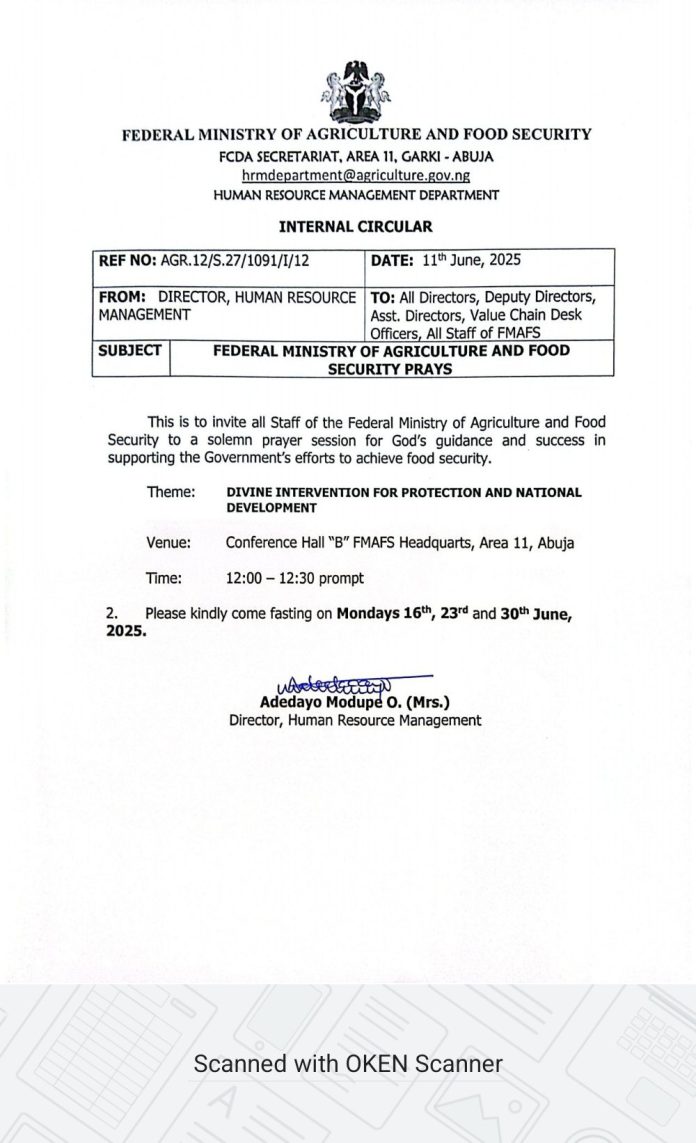The Federal Ministry of Agriculture and Food Security has announced a three-day fasting and prayer programme aimed at seeking divine intervention for Nigeria’s growing food insecurity.
However, the plan was abruptly suspended without explanation.
An internal circular dated June 11, 2025, and signed by the Director of Human Resource Management, Mrs. Adedayo Modupe, urged all ministry staff to fast and gather for a 30-minute prayer session at 12:00 p.m. on June 16, 23, and 30.
The sessions were scheduled to hold at Conference Hall B of the ministry’s headquarters in Area 11, Abuja.
The memo, referenced AGR.12/S.27/1091/1/12, was addressed to all Directors, Deputy Directors, Assistant Directors, Value Chain Desk Officers, and other ministry staff.
Modupe stated, “This is to invite all Staff of the Federal Ministry of Agriculture and Food Security to a solemn prayer session for God’s guidance and success in supporting the government’s efforts to achieve food security.
“Theme: Divine Intervention for Protection and National Development.
“Please kindly come fasting on Mondays 16th, 23rd and 30th June 2025.”
But in a twist, the ministry has indefinitely suspended the exercise.
Responding to an inquiry from THE POINT, Acting Director of Information, Ezeaja Ikemefuna, confirmed the suspension late Friday.
A follow-up circular sent to staff read, “I am directed to inform all staff that the prayer sessions scheduled to commence on Monday have been postponed till further notice. All staff should kindly take note.”
This development comes amid rising concerns about worsening hunger and malnutrition in Nigeria.
According to recent projections by the World Food Programme (WFP), approximately 33.1 million Nigerians could face food insecurity by 2025.
The WFP warned that the number of Nigerians at emergency levels (Phase 4) of food insecurity could increase from 1 million in 2024 to 1.8 million in 2025 an 80 percent rise.
“Nationally, the number of people facing emergency levels (Phase 4) of food insecurity is projected to rise,” the WFP stated.
“Although no populations are classified as Catastrophe (Phase 5), those in Emergency (Phase 4) are expected to increase from 1 million in the peak of the 2024 lean season to 1.8 million in 2025 a significant 80 percent rise.
“Trend analyses for the northeastern states indicate consistently high or rising food insecurity levels since 2018. The number of people requiring urgent assistance has increased by at least 4 million annually during the lean season since June 2020,” it added.
WFP Country Director, David Stevenson, underscored the urgent need to address conflict in the North East, which continues to disrupt farming and food production.
“Restoring peace in the northeast is critical for us to build pathways to production and achieve the northeast’s potential as the food basket of the country,” he said.
The WFP also flagged a looming child malnutrition crisis, warning that 5.4 million children and nearly 800,000 pregnant and breastfeeding women are at risk of acute malnutrition in six of the hardest-hit states Borno, Adamawa, Yobe, Sokoto, Katsina, and Zamfara.
Of the 5.4 million children affected,
“1.8 million children could face Severe Acute Malnutrition (SAM) and require critical nutrition treatment,” the report noted.
UNICEF Country Representative, Ms. Cristian Munduate, issued a stern warning against slow action: “Children are at the centre of the food insecurity crisis and face irreversible consequences both physical and cognitive, and potentially even death. It is our moral imperative to ensure that the right of every child to adequate food and nutrition is upheld.”
Also responding, Dominique Koffy Kouacou, the FAO Representative to Nigeria and ECOWAS, stressed long-term solutions: “FAO, alongside our partners, is committed to implementing sustainable solutions that address the underlying causes of food insecurity and malnutrition. By improving agri-food systems, we aim to meet immediate needs while building lasting progress.”
Meanwhile, the Permanent Secretary of the Agriculture Ministry, Temitope Fashedemi, has assured stakeholders that the government would use the findings of the WFP report to coordinate responses.
“We will use the report’s findings to guide food and nutrition security interventions across federal agencies, humanitarian organizations, and other partners in Nigeria,” he said.

